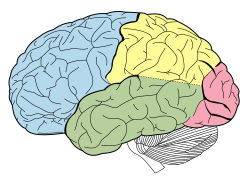
Back علم النفس العصبي السريري Arabic Klinische Neuropsychologie German Κλινική νευροψυχολογία Greek Kliiniline neuropsühholoogia Estonian Neuropsicologia clinica Italian კლინიკური ნეიროფსიქოლოგია Georgian 임상신경심리학 Korean Klinická neuropsychológia Slovak Klinik nöropsikoloji Turkish Клінічна нейропсихологія Ukrainian
This article may contain an excessive number of citations. (April 2025) |
This article may require copy editing for grammar, style, cohesion, tone, or spelling. (July 2024) |
| Part of a series on |
| Psychology |
|---|
| Neuropsychology |
|---|
 |

Clinical neuropsychology is a subfield of psychology concerned with the applied science of brain-behaviour relationships. Clinical neuropsychologists apply their research to the assessment, diagnosis, treatment, and rehabilitation of patients with neurological, medical, neurodevelopmental, and psychiatric conditions.[1] The branch of neuropsychology associated with children and young people is called pediatric neuropsychology.
Clinical neuropsychology is a specialized form of clinical psychology focused on research as a focal point of treatment within the field.[2] For instance, a clinical neuropsychologist will be able to determine whether a symptom was caused by a traumatic injury to the head or by a neurological/psychiatric condition. Another focus of a clinical neuropsychologist is to find cerebral abnormalities.[2]
Assessment is primarily by way of neuropsychological tests, but also includes patient history, qualitative observation, neuroimaging and other diagnostic medical procedures. Clinical neuropsychology requires an in-depth knowledge of: neuroanatomy, neurobiology, psychopharmacology and neuropathology.[medical citation needed]
- ^ National Academy of Neuropsychology. "NAN definition of a Clinical Neuropsychologist". National Academy of Neuropsychology website. Archived from the original on 26 November 2011. Retrieved 7 December 2011.
- ^ a b Goldstein, Laura H.; McNeil, Jane E., eds. (2013). Clinical neuropsychology : a practical guide to assessment and management for clinicians (2nd. ed.). Chichester, West Sussex: Wiley-Blackwell. pp. 3–18. ISBN 9780470683712.
© MMXXIII Rich X Search. We shall prevail. All rights reserved. Rich X Search